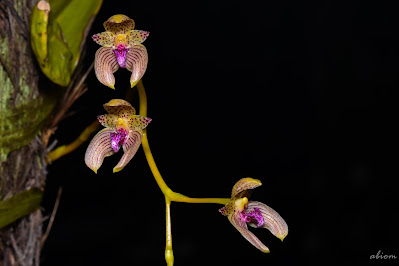Bulbophyllum anceps, also called as The Double Edged Bulbophyllum is found growing on tree trunks in forests in many parts of Borneo at 0-300m a.s.l.
Bulbophyllum anceps, also called as The Double Edged Bulbophyllum, Bulbophyllum racemosum is a species of the genus Bulbophyllum. This species was described by Robert Allen Rolfe in 1892.
IDENTIFY BULBOPHYLLUM ANCEPS - THE DOUBLE EDGED BULBOPHYLLUM
Bulbophyllum anceps is native to Borneo. It is found growing on tree trunks in forests in many parts of Borneo at elevations of 0-300 meters above sea level.
It is a small sized, hot growing epiphyte which reaching 10-15 cm in height with hairy rhizome. The pseudobulbs are flat and round to oval shaped, 1-leaved, 3 to 6 cm between each. Because the flat shapes of its pseudobulbs, sometimes seen as overlapping like scales. The single leaves are apical, elliptic to elliptic-oblong, rounded.
The Double Edged Bulbophyllum blooms in the summer from the 9 to 22 cm long, 2 to 5 flowered inflorescence with acute floral bracts. The flowers are 2-2.5 cm in diameter, non fragrant and lasts about 5-8 days.
BULBOPHYLLUM ANCEPS - THE DOUBLE EDGED BULBOPHYLLUM CARE AND CULTURE
Cultural information should only be used as a guide, and should be to be adapted to suit you. Your physical location; where you grow your plants, how much time you have to devote to their care, and many other factors, will need to be taken into account. Only then can you decide on the cultural methods that best suit you and your plants.
Light:
Bulbophyllum anceps need intermediate light about 15000-20000 lux. Higher light, that does not damage the leaves, seems to result in better and more frequent blooming. They can be grown indoors providing they receive good light.
Temperature:
The Double Edged Bulbophyllum require warm temperatures from 21-27°C but will be comfortable in a temperature range of 7 to 35°C. They will not tolerate frosts. They need a temperature drop of about 6-8°C at night for flowering.
Humidity:
The plant prefer high levels of humidity (about 70%) and very good air circulation year round. Good air movement is important to reduce the problem of leaf fungal disease due to frequent watering.
Substrate, growing media and repotting:
Bulbophyllum anceps can be grown mounted on slabs of cork or tree fern. However, the species can be grown in shallow pots, or even baskets. One requirement is to retain enough moisture at the root, as the plant don’t like to dry out. The rhizome can be trained to stay in the pot by bending them, eventually cutting the old bulbs and leaving them in place, so they will provide additional growth in the pot. Sphagnum has been popular because it retains a lot of moisture, which is what these plants prefer when in active growth; however when it decays or starts to retain too many salts, the plants will have problems. A mixture of small bark and perlite is also suitable.
Repot as infrequently as possible. Repotting is best done in spring or autumn when new growth appears at a frequency of about every 3 years.
Watering:
The Double Edged Bulbophyllum need to have ample water supply when the plants are in active growth, and a drought of even a couple of days is enough to kill the new growths and set back the plant. Due to their shallow fine root system they need to have constant moisture around their roots, however depending on their origin, some need a distinct wet and dry period to flower. The potting mix should never be allowed to dry out completely. They can be kept slightly drier in winter.
Fertilizer:
A balanced weak liquid fertilizer about once per month to weekly is recommended. They also enjoy fish emulsion and other organic fertilizers.
BUY BULBOPHYLLUM ANCEPS - THE DOUBLE EDGED BULBOPHYLLUM AND RELATED PRODUCTS
BUY ANOTHERS SPECIES AND VARIETIES OF BULBOPHYLLUM ORCHID GENUS HERE!















COMMENTS